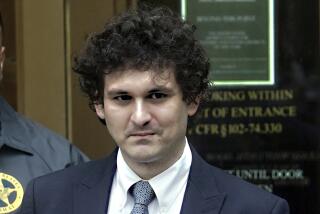BankAmerica Warning Not Disclosed
- Share via
SAN FRANCISCO — BankAmerica Corp., sued Monday by California for mishandling municipal bond accounts, was warned by its outside auditor in 1993 that its internal controls for handling the accounts had “significant deficiencies.”
The unit, called the Corporate Trust Operations Center, handled more than $100 billion in municipal debt service funds from 1978 to 1992. California’s suit charges that BankAmerica cheated thousands of municipalities in the state out of hundreds of millions of dollars in its handling of the funds. A related suit was filed by San Francisco last Thursday.
Among other things, outside auditor Ernst & Young said the bank failed to keep adequate records of outstanding checks, bond interest and called or matured bond certificates.
In a letter dated April 23, 1993, the audit firm wrote Chester Galezio, vice president and manager of BankAmerica’s Corporate Trust Operations Center, that if the problems had been found in an audit of the unit, they would have constituted a “reportable condition” as defined by the American Institute of Certified Public Accountants.
“Reportable conditions involve matters coming to our attention related to significant deficiencies in the design or operation of the internal control structure,” according to the Ernst & Young letter, obtained by Bloomberg News. Ernst & Young found the deficiencies after the bank asked it to assist its investigation.
BankAmerica didn’t disclose Ernst & Young’s warning in its filings with the Securities and Exchange Commission because it didn’t consider it material, a spokesman said.
BankAmerica spokesman Peter Magnani said the bank began an internal investigation of its trust unit’s billing procedures in 1993 after a customer’s inquiry. It received assistance from Ernst & Young. He wouldn’t comment on the auditor’s letter or the study.
“There are literally hundreds of thousands of documents,” he said. “You’ve got to look at the context. We don’t know what it is.”
An Ernst & Young partner declined to comment on the letter.
More to Read
Inside the business of entertainment
The Wide Shot brings you news, analysis and insights on everything from streaming wars to production — and what it all means for the future.
You may occasionally receive promotional content from the Los Angeles Times.










